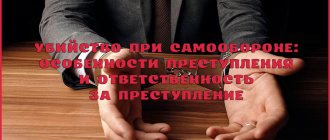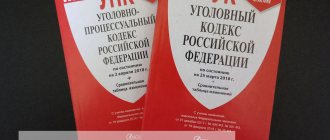Lawyer under Art. 108 of the Criminal Code of the Russian Federation, defense in cases of murder when the limits of necessary defense are exceeded or when the measures necessary to detain the person who committed the crime are exceeded
Exceeding the measures of necessary defense - where and under what circumstances the defense is within the permissible limit, how this limit is established. Each citizen may have his own, different from others, idea of the necessary defense; for some, defending fist against the attacker’s fist is already excessive; others will not be able to defend themselves even with the help of weapons. Extremes happen, but most often law enforcement agencies “go too far” when they are put in the dock under Art. 108 of the Criminal Code of the Russian Federation includes innocent people who protect their loved ones, their home from attacks, threats to life or health, and robbery.
The accusatory bias in the investigation, in the prosecutor's office and in court, the fear of officials to accept responsibility for decisions made based on real circumstances leaves no chance for the defender who caused the death of his attacker to avoid criminal prosecution. For the law enforcement system, if there is a murdered person, then a case will be opened, but it is not customary to stop criminal cases. So think about what is better - to be a living accused or a dead (crippled) victim.
Article 108 of the Criminal Code of the Russian Federation in part one provides for liability for murder committed in excess of the limits of necessary defense up to two years of imprisonment, and in part two for exceeding the measures necessary to detain a person who committed a crime up to three years of imprisonment. Both the first and second parts of Art. 108 of the Criminal Code of the Russian Federation belong to the category of crimes of minor gravity.
Lawyer under Art. 108 of the Criminal Code of the Russian Federation Murder in excess of necessary defense
Lawyer under Art.
108 of the Criminal Code of the Russian Federation can help protect against unfounded charges of exceeding the limits of necessary defense or exceeding the measures necessary to detain a person. In such cases, despite the obligation of the investigation to establish all the circumstances of the act, the defense must prove that the criminal offense was of such a degree and posed such a danger that the measures taken by the client were fully justified. CRIMINAL LAWYER call now: ☎ 8 (495) 532-75-40
What points are taken into account?
The Criminal Code is quite loyal to excess of self-defense. However, during the proceedings, even the smallest details are taken into account that could show whether there was intent or not and what the elements of the crime were.
A crime committed by a civilian or an official is considered in a similar manner:
- A general assessment of the situation is underway. Investigators collect testimony from witnesses (if any) and determine the circumstances of the incident. They also find out whether the attack could have caused death or serious health problems, and whether the permissible level of self-defense was exceeded.
- The offender undergoes a medical examination, during which it is determined whether he was injured in a violent manner, as well as his condition at the time of the crime (the influence of alcohol, drugs, medications, psychological trauma). A psychological examination also reveals the attitude of the criminal towards the murder and the murdered person.
- During the investigation, the officer in charge of the case collects information about the life of the criminal before the murder was committed, and based on this, builds a unique portrait of the person.
- Investigators are also obliged to find out whether the people involved in the case knew each other, respectively, the criminal and the victim, whether the conflict could have matured before the fateful day or not, and if it could, then who could have initially been the aggressor.
- The investigative team conducts an experiment in which the criminal shows how the crime was committed, and also evaluates the weapons used by both sides.
It is especially important to note the fact that the decision on punishment is made not by the inquiry officer, not by the investigator, but by the court. Therefore, you should not trust what law enforcement officers say during interrogations and agree to their conditions.
In addition, everything that has ever been written down by people leading the case needs to be read and understood. If the suspect’s testimony is recorded incorrectly, then there is no need to sign such papers under pressure, since the case, with the slightest change in the description of the situation, can be reclassified from Article 108 to 105, 107 or 109. The difference is very vague, and the punishment is completely different.
Based on objective data about the situation, the killer of the attacker may not receive a sentence, but may go under Article 37 of the Criminal Code, which, although it does not provide for murder, has a very important point in its interpretation. Part 2.1 of this article says that exceeding the necessary self-defense is permissible if a person did not realize the actual level of threat and could not objectively assess the situation due to the speed of events, without being under the influence of any drugs.
However, it is impossible to prove that the subject of the crime should not be held liable under Article 108, but falls under Article 37. This is confirmed by the scandalous statement of Anton Tsvetkov, a member of the Public Chamber of the Russian Federation, who in July last year noted the fact that a woman does not have the right to kill a rapist due to the absence of a threat to life, and therefore she will suffer the most severe punishment possible for Article 108 Part 1 .
Second commentary to Art. 38 of the Criminal Code of the Russian Federation
1. All citizens without exception have the right to detain a person who has committed a crime (hereinafter - AP).
2. There are two groups of conditions that indicate the legality of causing harm in the case of a crime. One of them relates to the characteristics of the crime that the detainee committed and his behavior during detention (first group); the second - to the characteristics of the harm caused during the arrest and the circumstances of the arrest itself (second group).
3. The first group of legality conditions:
1) the detained person has committed a crime, the nature and degree of danger of which can be any. But for this crime the law must provide for punishment in the form of imprisonment (see Article 91 of the Code of Criminal Procedure; this is a necessary condition for the use of detention);
2) the actions of the detained person must indicate his desire to evade responsibility.
4. The second group of legality conditions:
1) the person must be aware that he is detaining the person who committed the crime;
2) the purposes of detention are to bring the person to the authorities and to suppress the possibility of him committing new crimes;
3) detention is carried out by causing harm to the person who committed the crime;
4) it was not possible to detain the person who committed the crime by any means other than causing harm;
5) during detention, the measures necessary for this should not be exceeded.
5. Signs of exceeding the measures necessary for detention are simultaneously:
1) a clear discrepancy between the harm caused to the detainee and the nature and degree of public danger of the crime he committed;
2) a clear discrepancy between the harm caused and the circumstances of the arrest;
3) the intentional nature of the harm caused.
Excess of self-defense - Article 114 of the Criminal Code of the Russian Federation
The extent of liability for exceeding self-defense depends on the consequences. Article 114 of the Criminal Code of the Russian Federation considers cases of causing serious harm to the health of an attacker or harm of moderate severity. The sentence under this article does not exceed 1 year.
The following is acceptable as punishment:
- imprisonment for a maximum of one year;
- corrective or forced labor for a period of up to one year.
Correctional labor takes place at the place of employment of the accused, and forced labor is considered a substitute for imprisonment. For forced labor, a person is sent to a correctional center. Such a center may be located in another region.
According to Article 50 of the Criminal Code of the Russian Federation, during correctional work, the state withholds from 5 to 20% of the convict’s salary.
Jobs cannot be assigned:
- pregnant women;
- women who have children under 3 years of age;
- military personnel;
- disabled people of group 1.
If a convicted person deliberately evades correctional labor, the court has the right to sentence him to forced labor or imprisonment. When it turns out that the harm to health was caused intentionally, the sentence can be up to two years.
Acceptable actions of self-defense under Article 114 of the Criminal Code of the Russian Federation are those that do not entail serious bodily harm to the attacker. There will also be no punishment if slight harm to the offender’s health is caused.
What is taken into account in court
If self-defense resulted in the death of the attacker or injury to health, the court will consider the following circumstances:
- the relationship between the possible or inflicted harm of the offender and the response of the victim;
- nature of the danger: attack with a knife, attempted rape;
- physical characteristics of the victim and the offender;
- other circumstances: number of attackers, age, presence of weapons.
An important factor in the case will be the mental state of the victim at the time of the crime. The court takes into account the fact that a person responded in a state of passion. In fact, he could not adequately assess the situation.
In judicial practice there are cases when:
- the criminal stopped threats and other attacks, but was still killed;
- the person was provoked into attack;
- the victim had the weapon, not the perpetrator. In this case, it will not be defense, but an attack on an unarmed person;
- the criminal was killed after he was apprehended or neutralized.
Note!
Defense must be equivalent to attack. It is prohibited to use a pistol or knife against an unarmed criminal.
Commentary to Art. 38 Criminal Code
1. The conditions for the legality of causing harm when detaining a person who has committed a crime, relating to the grounds for detention (i.e., the crime committed by the person), are: a) only the person who has committed the crime can be detained by causing harm; b) the right to detention arises after the end of the criminal offense in the broad sense of the word and until the expiration of the statute of limitations for criminal prosecution or the expiration of the statute of limitations for a court conviction. Questions regarding the application of Art. 38 of the Criminal Code are devoted to paragraphs 18 - 24 of the Resolution of the Plenum of the Supreme Court of the Russian Federation of September 27, 2012 No. 19.
In this case, it is possible to cause harm when detaining a person who has committed any crime, if other conditions for the legality of causing harm are met, and in particular the condition of proportionality of the harm caused to the nature and degree of public danger of the crime and the situation of detention. In other words, the less dangerous the crime for which a person is detained, the less harm can be caused to him during detention.
2. The conditions for the legality of causing harm during the detention of a person who has committed a crime, relating to the actions of the detainee, are: a) harm during the detention must be caused only to the person who committed the crime; b) when detaining, the situation of detention must be taken into account, i.e., in other words, causing harm must be carried out involuntarily, and be the only method of detention. At the same time, resistance during arrest transforms this circumstance, which excludes the criminality of the act, into a necessary defense; c) the purpose of the arrest must be to deliver the person to the authorities and (or) to suppress the possibility of him committing new crimes; d) when arresting, it is necessary to ensure that the harm caused corresponds to the nature and degree of social danger of the crime committed and the situation of the arrest, i.e. not to exceed the measures necessary to detain the person who committed the crime.
3. Exceeding the measures necessary to detain a person who has committed a crime is recognized as their obvious discrepancy with the nature and degree of public danger of the crime committed by the detainee and the circumstances of the detention, when the person is unnecessarily caused clearly excessive harm not caused by the situation.
The current law establishes criminal liability only for murder, intentional infliction of grievous and moderate harm to health by exceeding the measures necessary to detain the person who committed the crime (Part 2 of Article 108, Part 2 of Article 114 of the Criminal Code). Accordingly, the intentional infliction of minor harm to health, as well as beatings, under no circumstances can be considered as an excess of the measures necessary to detain the person who committed the crime.
4. The issue of the admissibility of causing death to a person during the arrest is ambiguously resolved. On the one hand, it is indicated that allowing death to be caused during detention would be contrary to the meaning of this norm and the purposes of detention specified in the law (delivery of a person to the authorities).
On the other hand, it is permissible to take the life of a detainee in exceptional circumstances, when the crime committed is extremely socially dangerous and there is a risk that, having escaped, the person will continue criminal activity of a similar nature and degree of social danger.
5. It is necessary to distinguish between causing harm when detaining a person who has committed a crime from necessary defense. Causing harm during an attack for the purpose of protection forms a state of necessary defense. On the contrary, causing harm after the end of the assault in order to detain a person and suppress the possibility of him committing new crimes already constitutes causing harm when detaining the person who committed the crime. Accordingly, causing harm after the end of the assault, but not for the legitimate purposes specified in the commented article, but, for example, for the purpose of reprisal, constitutes an intentional crime, classified on a general basis.







